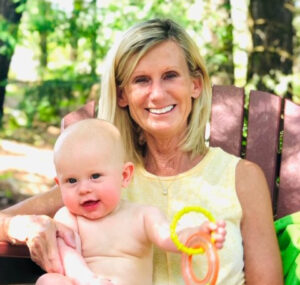By Hank Milius, President and CEO, Meridian Health Services—
Muncie, IN—Just recently, I was living in a hotel for a week because my wife, Terri, kicked me out of the house after 40+ years of marriage. Articles don’t usually start this way, but as we all know, this year has been far from normal. Please allow me to explain.

Terri Milius with grandson, Beckett.
We have 10 grandkids and Terri prides herself as being “the greatest grandma in the world.” We know this to be true because the grandkids gave her a coffee mug stating as much! It’s been quite some time since Terri visited Beckett, grandkid #8 in Missouri. She spent three days playing with Beckett and having the time of her life.
Upon driving back to Indiana after her visit, Beckett’s parents learned that he was exposed to his daycare teacher who tested positive for COVID. Of course, they were concerned about Beckett, but now also concerned about Grandma.
Terri immediately called me and said, “There’s a chance I may get COVID, you need to leave the house and go to a hotel for the next couple of days.”
So for a few days we lived separately. After experiencing being apart, I cannot imagine how loved ones were separated from one another when hospitalized for COVID. After I moved back home we decided to wear masks to be abundantly cautious. Beckett did not exhibit any symptoms which was a great relief. After a few more days Terri tested negative for COVID at Meridian. She was relieved, but I am still suffering from “separation anxiety.”
Why do I mention this personal experience? The primary reason is to help all of us prepare to make decisions about gathering with loved ones over the holidays.
This will be a very personal and difficult decision for many of us. We are all yearning for family connection during this time of social distancing. We are concerned for members of the family who are aging or have underlying medical conditions. These are valid concerns especially as we enter cold weather, socializing in small quarters and experiencing an increase in COVID cases.
Dr. Anthony Fauci, our country’s authority on infectious diseases at the National Institutes of Health, isn’t isolated from the problem. He has three adult daughters, each living in a different state, decided that his family’s Thanksgiving reunion was off, given the risks.
“You may have to bite the bullet and sacrifice that social gathering, unless you’re pretty certain that the people that you’re dealing with are not infected,” he said.
According to a recent survey of nearly 10,000 adults by CivicScience, only 27% of people say they are celebrating Thanksgiving as they normally would. Those still gathering are taking precautions, 20% plan to be with a smaller group, 14% plan to wear masks and 14% plan to social distance. Two-thirds of adults think traveling for the fall and winter holidays poses at least a moderate risk to their health and well-being, according to a recent Axios/Ipsos poll.
This may be the year for virtual family celebrations or in-person, outdoor Friendsgivings. I read about a family in Massachusetts who is doing a “Tailgating Thanksgiving” in their backyard. Their plan includes outdoor deep fryers and a fire pit to roast marshmallows.
Some of this may sound overly cautious. People may ask how we can give up these family traditions, when we’ve already gone through eight months of sometimes stressful and depressing isolation. But that’s exactly the point. We should be having these discussions with family members because we should not let that sacrifice be for naught.
Our collective efforts to inhibit Covid-19 in formal settings are working — such as wearing masks and limiting interactions. Places like retail stores that follow strict protocols are safely remaining open. Many businesses have improved workplace safety, and people are using more caution around people they don’t know.
But we must now turn our attention to informal settings with those we do know and love. This will require a significant shift in our thought processes. According to the CDC, nearly 50% of all Covid-19 spread is by people who have no symptoms. Someone you know could just as easily be an asymptomatic carrier as a stranger. The simple fact is that we should be just as careful in relatives’ homes as we are in grocery stores.
With these things in mind, there are some incredibly creative suggestions out there for handling the holidays. I found this small list in an article online from the Connecticut Children’s Medical Center to be very thoughtful.
- During a family Thanksgiving video chat, have your child host “opening” and “closing ceremonies.”Your child might want to kick things off with a song or prayer, and wrap up with a round of jokes or the latest TikTok dance. With old traditions on hold, the possibilities are endless.
- Try a new twist on a pot luck.Since you’ll all be dining as separate households, a traditional pot luck is out the window. But you can still ask every person to “bring” something to contribute – like a brief toast or favorite family photo to share virtually.
- Try a gratitude bowl.Have all the households in your extended family start this process a few weeks before Thanksgiving. Each day, each person writes something they’re grateful for on a slip of paper and adds it to their household bowl. During your Thanksgiving virtual event, take turns reading aloud.
I have already encouraged members of the Meridian family to use resources like these as they make decisions for their families. Given our mission to help make our communities healthier, I feel compelled to encourage you to do the same. Each of our families has unique circumstances to consider. As we make these decisions, you may want to keep the following quote in mind, “Home isn’t so much a place. Home is where your heart is.”

Hank Milius, President/CEO, Meridian Health Services
About Meridian Health Services
Meridian Health Services is a regional, progressive healthcare organization specializing in “whole-person” health, integrating physical, mental and social well-being to help people achieve their optimum health. Meridian serves more than 40,000 patients throughout Indiana offering a wide spectrum of healthcare specialties including: primary medical care, pediatrics, internal medicine, inpatient/outpatient psychiatry, obstetrics/gynecology, addictions and recovery, dental, senior health, children and family programming, behavioral health and human services.



